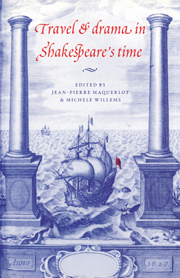Book contents
- Frontmatter
- Contents
- List of contributors
- 1 Introduction
- 2 Foreign relations in Jacobean England: the Sherley brothers and the ‘voyage of Persia’
- 3 ‘The naked and the dead’: Elizabethan perceptions of Ireland
- 4 The Elizabethans in Italy
- 5 Tragic form and the voyagers
- 6 Nationality and language in Thomas Kyd's The Spanish Tragedy
- 7 Marlowe's Argonauts
- 8 Pirates and ‘turning Turk’ in Renaissance drama
- 9 The wrong end of the telescope
- 10 ‘Travelling hopefully’: the dramatic form of journeys in English Renaissance drama
- 11 ‘Seeing things’: Amazons and cannibals
- 12 Industrious Ariel and idle Caliban
- 13 The New World in The Tempest
- 14 ‘What's past is prologue’: metatheatrical memory and transculturation in The Tempest
- 15 Lope de Vega and Shakespeare
- Index
9 - The wrong end of the telescope
Published online by Cambridge University Press: 22 September 2009
- Frontmatter
- Contents
- List of contributors
- 1 Introduction
- 2 Foreign relations in Jacobean England: the Sherley brothers and the ‘voyage of Persia’
- 3 ‘The naked and the dead’: Elizabethan perceptions of Ireland
- 4 The Elizabethans in Italy
- 5 Tragic form and the voyagers
- 6 Nationality and language in Thomas Kyd's The Spanish Tragedy
- 7 Marlowe's Argonauts
- 8 Pirates and ‘turning Turk’ in Renaissance drama
- 9 The wrong end of the telescope
- 10 ‘Travelling hopefully’: the dramatic form of journeys in English Renaissance drama
- 11 ‘Seeing things’: Amazons and cannibals
- 12 Industrious Ariel and idle Caliban
- 13 The New World in The Tempest
- 14 ‘What's past is prologue’: metatheatrical memory and transculturation in The Tempest
- 15 Lope de Vega and Shakespeare
- Index
Summary
At the beginning of Utopia Sir Thomas More offers to justify presenting yet another traveller's tale. Nothing, says More, ‘is more easy to be found, than be barking Scyllas, ravening Celaenos, and Laestrygonians, devourers of people, and such like great and incredible monsters; but to find citizens ruled by good and wholesome laws, that is an exceeding rare and hard thing’. More gains his ironic effects through straight-faced parody. In the account of Utopia the narrative conventions of the traveller's tale are preserved, and with them the usual anticipation of the exotic and marvellous; only in place of barbaric rites comes a description of a society which uses – of all things – reason as a basis for social organization. Since the name of the narrator, Hythloday, in Greek means ‘dispenser of nonsense’, a Lucianic intention has been shrewdly suspected here, although commentators differ in their assessment of how far the Lucianic influence goes. On the one hand, there are those like Douglas Duncan who argue the case for Utopia as wilfully provocative, in the Lucianic spirit of serious play, seeing More's intention as to highlight problems, ‘not to test perception of a “true” point of view so much as to enforce awareness of difficulty’. On the other hand, are those like Paul Turner, believing that the book does attempt to solve the problems of human society.
- Type
- Chapter
- Information
- Travel and Drama in Shakespeare's Time , pp. 141 - 159Publisher: Cambridge University PressPrint publication year: 1996
- 1
- Cited by



